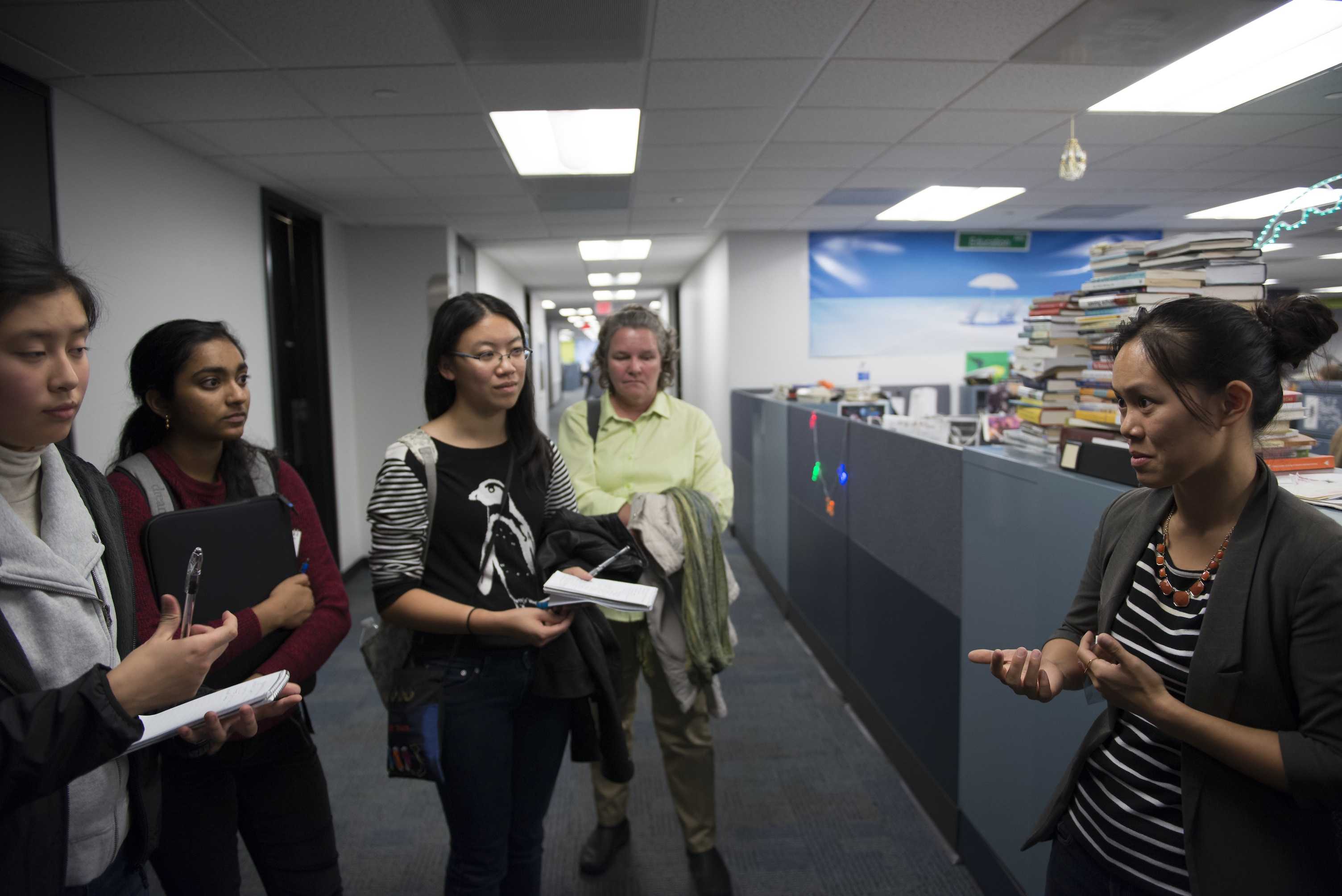Upper School journalists explore investigative journalism in Washington D.C.
November 7, 2014
Washington, D.C.– Nineteen Upper School journalists traveled to Washington D.C. this week for the We the Media JEA/NSPA Fall 2014 Convention, spending today engaging in four adventures in the nation’s capital: A tour of The Washington Post, a keynote address by Bob Woodward, a visit to the Pulitzer Center for Crisis Reporting, and a meeting with Hannah Allam, State Department reporter for the McClatchy-Tribune News Service.

Emily Chow (’08) offers final words of advice to seniors Jessica “Fred” Chang, Apoorva Rangan, and Kacey Fang. Students were encouraged to ask questions throughout the tour about her personal and professional experiences as a Harker alumnus.
Alum discusses journey to journalism career at Washington Post
Standing in front of what seemed to be an interminable mass of cubicles sporadically populated with men and women staring at their device screens or engaging in intense conversation with one another, she smiled widely and spread her arms to her sides.
“Welcome to the newsroom,” said Emily Chow (‘08), Graphics Designer of the Washington Post.
Clad simply yet smartly in a grey blazer, striped black and white shirt adorned with an orange necklace, jeans and olive green boots, Chow grinned and spoke easily when addressing her role at the Post, the paper’s processes, and her own journey from the Harker Upper School to the Post position where she currently operates.
Chow led the way to the north wall of the building, where two managing editors and the executive editor of the Post have their offices. She introduced Lee Hockstader, an editorial writer and member of the Post’s editorial board, and James Downie, the Digital Opinion Editor. Both spoke at length about the editorial process and the future of journalism for students.
She then showed the way to her own section’s area, leading the way across the fifth floor through section after section, as the education pod blurred into the political blogger section and into economics and more. Her own cubicle’s counters were covered with keepsakes, two computers, and other paraphernalia, and the bulletin board along her wall was tacked over with cards and flowcharts, a mix of seriousness and humor.
She walked over to the photojournalism table and laid out her experiences and reflections on her position at the Post.
Chow was a Harker journalism staff member for all four years of high school under former journalism advisor Chris Daren.
“I spent a lot of time in the visual aspects of journalism and yearbook,” she said.
She attended Northwestern University’s Medill School of Journalism, Media, Integrated Marketing Communication in the class of 2012. She recalls also working for the Office of Communications, shooting summer photos for the Harker Quarterly. In the summers between her years of college, she worked as an intern at Sunset magazine, Chicago Tribune, and finally the Washington Post.
Next, she discussed the infographics team.
“We bridge everything, if you’re talking about skillsets. Everyone in this team is talented,” Chow said.
She referred to members of the section as “people who can tell a beautiful story.”
“We ask the question, ‘what is still missing that we can provide?’” she said of the infographics process.
Chow was introduced to coding interactive graphics online from an older classmate at Northwestern.
“It kind of brought a whole new light to journalism,” she said. “It changed what I realized you could do.”
Chow’s primary hurdles in infographic design lie in how the Post’s userbase consumes material across devices in different ways, remarking on the growing uses of tablets and smartphones to view Washington Post material as compared to laptops and desktop computers.
“I don’t think they’re limitations,” she said. “I think they’re challenges.”
Though she admitted that she does not always have time to pursue other hobbies at length— “Journalism is a full-time job,” she quipped—rock-climbing, baking, or leisure reading, Chow insisted that her work on graphics is what she prefers to do most of the time.
Chow also mentioned the ongoing plans of redesigning the online pages for more readability and interactivity, referring to the current process as a “rethink.”
“Redesigning the website is not about redesigning the website,” she said. “You have to change the entire workflow to improve the experience behind it.”
A quick look around the fourth floor of the newsroom and a few parting words of advice from Chow concluded the tour.
“Stay curious,” she said to the group of high school journalist-hopefuls looking up at her from the table. “Life should not always be taken seriously.”
Chow, currently two and a half years into her professional career, expressed her current contentment at the Post with her team as well as the variability of the long future ahead of her.
Upper School Journalists visit the Washington Post
When the elevator doors opened, seventeen jaws dropped, like kids in a candy store. Or rather, like seventeen student journalists at The Washington Post.
Upper School student journalists visited the Post today for a behind-the-scenes look at a major national publication, learning about jobs ranging from editorial writing to interactive graphic design.
Guided by Graphics Editor and former Talon Editor-in-Chief Emily Chow (‘08), the students moved through the fifth and fourth floors of the Post, squeezing past cubicles and conference rooms. Chow began working at the Post upon graduating from Northwestern University’s Medill School of Journalism, Media, Integrated Marketing Communications.
Chow greeted her colleagues on the tour’s route, winding from the editorial department to PostTV. The full newsroom signaled the Post’s positive flux. The publication has expanded after a recent acquisition by Amazon founder Jeff Bezos that reinforced the existing staff with additional online and print writers.
Students experienced this generational breadth with 10-year editorial board writer and former foreign correspondent Lee Hockstader, as well as James Downie, the Digital Opinions Editor, in the editorial department’s conference room. Hockstader and Downie discussed the parallel management structures of the Post’s news and editorial pages and answered questions on opinion writing and coverage changes between their generations.
“It’s like the separation of church and state,” said Hockstader.
According to them, a staff of editors and writers exclusively generate content for the editorial pages in order to maintain impartiality. Hockstader also stressed the editorial content’s “independent newspaper” status.
“We are not in the Democrats’ camp, and we are not in the Republicans’ camp,” Hockstader said. “Our readers gloss over the ‘independent newspaper’ tag but it’s really important.”
Downie, a recent graduate of Columbia University, spoke to the group about the future of opinion writing and blogging in the advent of new media forms.
“There’s so many outlets forming every day looking for content,” Downie said. “I like to think quality rises to the top. That’s what I like about this industry.”
Harker Aquila Editor-in-Chief Alyssa Amick (12) commented on her impression of the Post and the message being conveyed.
“I think a message the journalists there emphasized was that it’s important to learn by doing,” Alyssa said. “They talked about how skill comes with experience, and if you do something it’s important to finish it and you can look back and learn from what you did to make your future work better.”
Talon Business and PDA Editor Alex Youn (10) counted the visit as an experience to observe real-world journalists.
“I was able to watch and talk to experienced reporters and editors who all share a common passion for journalism,” Alex said.
Throughout the trip, advisor Ellen Austin and chaperones Lauri Vaughan and Joshua Martinez accompanied the student journalists. Martinez commented on his original expectations surrounding the Post.
“I was really curious about The Washington Post after it was acquired by [Jeff] Bezos. Our tour illustrated the shift toward multimedia that I expected, but the passion for maintaining the character and history of the newspaper was something I discovered,” Martinez said.
Vasudha Rengarajan (12), Editor-in-Chief of Harker Aquila, enjoyed the exposure and believes that computer science is an integral aspect of online journalism.
“As a prospective college student, I would say that it was enlightening to see a different kind of profession you could do with [computer science] and integrating journalism which are two of my passions,” Vasudha said. “It was cool to see so many people working together from different fields and different backgrounds and different areas of expertise coming together to tell stories.”
Reporter Lauren Russell (9), a first-time conference attendee, cited the best part of the experience as the general aura of the Post.
“It was a different experience there, seeing all of the people and all the different sections and how many people it took to help make the whole paper and online a success,” Lauren said. “The entire atmosphere at the Washington Post was positive, friendly and colorful.”
Chow concluded the tour by recounting her experiences as a student journalist and talking to the staff about her background in graphics. At the end of the tour, the staff gifted Chow a Giants’ baseball.
“The main thing I tell Harker students is to have fun. Life doesn’t always need that much thought,” she said.
“Just stay curious.”
After one and one-half hours at the Post, the tour came to a close. The students returned to the elevators, minds full of memories, graphics and interviews to chew on.
Milestones of The Washington Post
Journalism students attend a keynote by Bob Woodward
Crisis reporting: Journalism versus advocacy
Woodward and Bernstein’s resulted in 48 government officials found guilty of breaking the law. Despite these charges and the eventual resignation of Nixon, Woodward still considers the greatest success of his Watergate exposée.
Despite the 48 arrests, eventual resignation of Nixon, and the initiation of President Ford, Woodward considers the greatest success of his Watergate exposée his tireless quest for the truth.
In today’s keynote address, Woodward quoted his former employer, publisher Katharine Graham when she said “Never? Don’t tell me never,” in response to Woodward’s concern that no one would ever uncover the full truth of the Watergate scandal.
For investigative journalists looking to be the next Woodward or Bernstein, the logistics of publication may present an obstacle to their pursuit of the full truth.
The Pulitzer Center on Crisis Reporting, located on Massachusetts Avenue, aims to deal with just that. It gives grants to journalists who hope to give a voice to stories otherwise muffled.
Founded by Jon Sawyer, the non-profit receives funds from other non-profits and decides which stories to invest in. The center specializes in funding foreign correspondence covering international stories like Djibouti, Nepal, and Yemen.
Senior adviser at the center, Marvin Kalb shared his thoughts on the importance of journalism with an organized tour of student journalists attending the convention at 11 a.m. today,
“Think of journalism as another form of teaching, only it’s mass education,” he said. “You’re an essential piece of the fabric of democracy.”
Amanda Ottaway, Education Coordinator at the center, then elicited opinions from the students on the difference between journalism and advocacy, emphasizing that the distinction should be preserved.
Like Woodward, Kalb and Ottaway emphasized the even-handedness in the searching for and reporting the full story, the primary purpose of investigative journalism.

